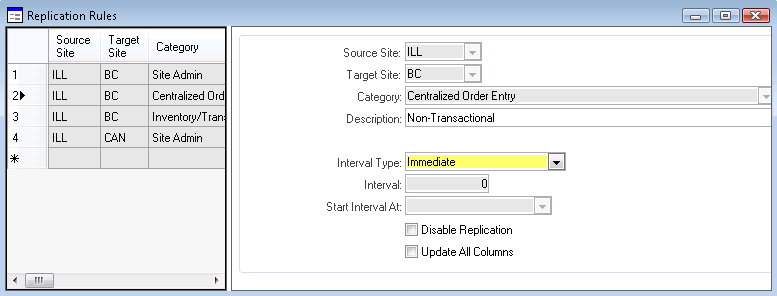Setting up replication categories and rules for non-transactional replication
-
Familiarize yourself with the default categories listed in the
Replication Categories form. Be aware of what
categories are available and what each one handles.
See the Multi-Site Planning Guide for additional information about the categories.
Use the default categories "as is" for now. You may want to add new categories later when your system is up and running.
Adding new categories and rules requires significant knowledge of the database and business rules. When multiple tables are related, the order of replication can be critical. Improperly creating and executing replication categories and rules can result in catastrophic loss of data. Ensure that all such development and testing is performed in a controlled pilot environment prior to implementation. We strongly suggest that you contact Infor Consulting Services for assistance.
-
In the
Replication Rules form at each site, set up
non-transactional rules for the
Site Admin category between this site and all
other sites where non-transactional replication will take place.

Add more non-transactional rules from this site to other sites, as appropriate.
- In the Interval Type field, select anything other than Transactional.
- You should have created a ReplicationRules
spreadsheet as part of your planning phase. You can save time by importing the
appropriate rules for each site from the spreadsheet into the grid on the form
at that site.
See Data load to and from spreadsheets for more information.
- If a rule refers to a site that is not set up with matching information in the Sites or Sites/Entities form, a validation error is displayed when you try to save the rule.
- At each site, open the Replication Management form and click Regenerate Replication Triggers.
If you have multiple sites per database, you can set up rules and regenerate triggers for all sites in the database from one site.